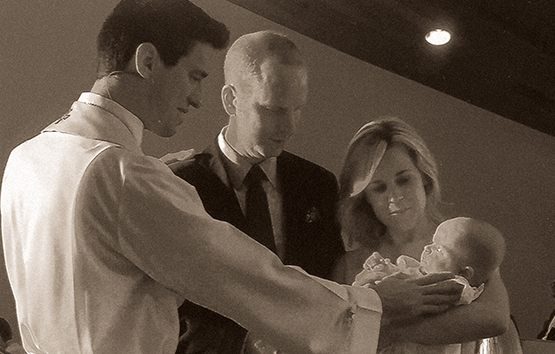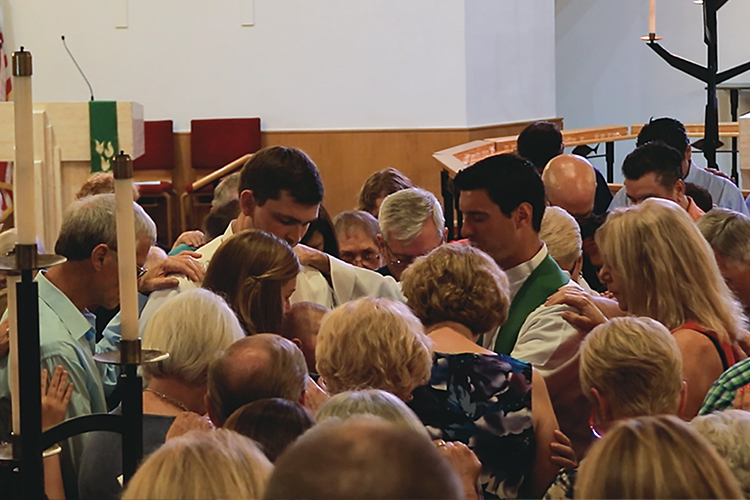
Concordia Seminary Newsroom
Q&A: Rev. Steve Carretto (’10)

By Melanie Ave
Rev. Steve Carretto’s path to the ministry was a winding one — sometimes fraught with doubt — but today he is ably leading the congregation where he served his vicarage while a student at Concordia Seminary, St. Paul Lutheran Church in Boca Raton, Fla. In this wide-ranging conversation, Carretto shares the ups and downs of his own pastoral journey, the forgiveness of Christ he feels and his great hope for LCMS congregations nationwide to share a certain kind of forgiveness with their pastors.
What was it like to grow up in small-town Nebraska as a pastor’s kid, the youngest of four children?
It was the good life. That’s what they call it. It really is the good life. Really close-knit community. People really care about each other.
You were quite the athlete as a young person, right?
My whole life revolved around sports. I was into football, basketball, track, golf. I excelled at those. I also excelled at not being a decent human being to other people.
In high school, with the encouragement of your parents, you transferred from a public school to a Lutheran school. What was the transition like?
I wanted to go back to the public school so bad until a teacher took me under his wing. He was my football coach. He was from my hometown. He was born and raised Lutheran. He knew I was getting into trouble, not doing what I needed to do. He just really drew near to me. He was my basketball coach during my senior year. I got a lot of awards and then scholarships to play in college. He kept directing me to Concordia [University] Seward. My mindset was, “I’m better than that.” But that’s where I signed on as an athlete. I pulled out a week before school started because I thought I could do better. That’s when the shaping of me as a man really started.
Explain.
My assistant coach from Concordia Seward called me. He said, “I see you pulled out.” I said, “Yeah. I’m going to a junior college. They are going to have a pipeline for me to go [Division 1].” He said, “Wow. It may be better for you as a basketball player, but if you come to Concordia, we will make you a man.” Those words really resonated with me. It was a challenge.
Your struggles resurfaced in college. What happened next?
When I came back my junior year to play basketball, I needed 12 hours [of classes]. I was registering late. The only classes that were left were Greek, public speaking, Christian philosophy and golf. It was this little alignment toward being a pastor. But to me, being a pastor was my dad. I was an athlete … and I was really taking to Greek! I really started getting into the Word of God more and more. There were people in my path that kept saying things I didn’t believe like, “You would make a good pastor.” I was like, “You don’t know who I am.” The reality was I didn’t know who I was.

Rev. Steve Carretto, center, leads his congregation in prayer for Vicar Jacob and Rebecca Schultz and their son, Isaiah, on their last Sunday at St. Paul Lutheran Church. Photo: Courtesy of David Watson
Fast forward past your graduation from Concordia Seward and your move to St. Louis with your wife, Jessica, who you met at college. You were two years into your pastoral formation at Concordia Seminary and you were still unsure of becoming a pastor?
I was a tennis pro. I was teaching in Des Peres [Mo.]. All of a sudden I started to see how I could use my talents and gifts in ministry. I was helping several Hindu families. I loved it so much that I went to my wife and said, “I think I could just do this. I don’t need to finish Seminary.” She said, “No. I think we are here for a reason.” She’s a very smart lady. Then we went into our vicarage year [to St. Paul Lutheran Church in Boca Raton, Fla.]. That absolutely changed everything. My vicarage was difficult. But it was exactly what I needed. The senior pastor retired in April. I came in July. He had been there 20 years. Then his two associates took calls in September and October. So I was the vicar with a congregation of 900 on a weekend. And it was incredible. I was it for about a month until they called an interim pastor.
Tell me about your return to the Seminary from vicarage and Call Day?
I actually received a call from my vicarage congregation to come back. I was delighted. It was great. I also was sorrowful because of my past. I actually brought my call papers and put them on [Emeritus Professor Dr. Bruce] Hartung’s table. I said, “I can’t do this.” That was after Call Day. I was in so much turmoil. He said the simple words: “Have you ever been to church? Have you ever heard the words you are forgiven?” I said, “Yeah.” He said, “I think you just need to bask in that.” He helped me through that. It just flowed over me. I said people need to hear about this forgiveness.
What advice do you have for current seminarians based on your own experience?
Stay the course. If I would have uprooted during my second year — because I thought I knew what God’s plan was for me — I would never have seen my third or fourth year, which shaped my whole life and ministry. I also would encourage students to spend time with professors, who really do care for them. They really molded and shaped me. Go have lunch with them. Spend time with them. For me, it was a life [at the Seminary]. It wasn’t just school. Treat it as life, not just an education.
Your congregation, thanks to a generous donor, recently started a debt-removal program for some seminarians, pastors and other church workers. What is your hope for this “forgiveness” program?
We want to work small and make a big impact. This frees church workers up to figure out how to do ministry instead of how to make ends meet. … We say two things to the people who we erase debt for: Give thanks to the Lord for He is good. And celebrate His continual provision of His Word. … What we want to see is other churches saying, “We can do that. We could go with one person and make a difference.” Then one person is two people is three people. It’s exponential. We have to work together as churches instead of just taking care of our own piece of property. We want to see it in a bigger picture, in a bigger realm in our Synod. We want to see us as congregations really caring for our pastors. Healthy leaders equal healthy congregations.
Melanie Ave is communications manager at Concordia Seminary, St. Louis.